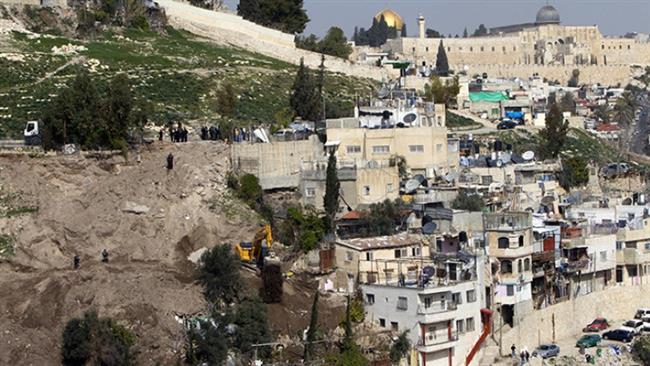
RNA - Ateret Cohanim has recently asked the Jerusalem al-Quds Magistrate's Court to issue eviction orders for the Palestinians families, who are living in the Batan al-Hawa area of Silwan neighborhood, Ha’aretz daily newspaper reported on Wednesday.
The group has employed various legal and economic methods over the past 15 years in a bid to evict the Palestinian residents of the area from their houses, irrespective of the fact that most of the locals have lived there for generations since 1950s or 1960s.
Over the past two weeks, Ateret Cohanim has sought two additional eviction orders against two Palestinian families, identified as Shihada and Ghaith, who are residing in nine apartments in Batan al-Hawa.
The eviction of Palestinians from their homes in Batan al-Hawa would create a sizable Israeli neighborhood in the heart of the predominantly Palestinian neighborhood of Silwan, the report said.
Illegal Amona settlers to resist eviction
Meanwhile, residents of an illegal settlement in the occupied West Bank have defied the Israeli supreme court’s decision to raze the outpost.
Spokesman of Amona, located northeast of Ramallah in the central West Bank, said the settlers would resist any demolitions carried out in the area.
The remarks came after Israel’s high court ruled on Monday that the evacuation of Amona “must occur before December 25” and rejected the delay requested.
The Israeli regime had sought a seven-month delay irrespective of an earlier ruling in 2014 by the supreme court that Amona was constructed on private Palestinian land, and had to be razed.
More than half a million Israelis live in over 230 illegal settlements built since the 1967 Israeli occupation of the Palestinian territories of the West Bank and East Jerusalem al-Quds.
The continued expansion of Israeli settlements in occupied Palestine has created a major obstacle to the efforts to establish peace in the Middle East.
The Palestinian Authority wants the West Bank as part of a future independent Palestinians state, with East Jerusalem al-Quds as its capital.
Jordan rejects Israel ban on Muslim prayers call
Also on Tuesday, Jordanian deputy minister for Awqaf and Islamic affairs dismissed Israel’s controversial and so-called “muezzin bill,” which is aimed at limiting the sound of prayers calls coming from Palestinian mosques.
“An occupier cannot make any historical change to the city it occupies, and things (must) remain the same without any change, a fact that underlines that any Israeli decision on Jerusalem is false and insignificant, for the city is under occupation,” Abdullah Abbadi said.
Abbadi added the Muslim call to prayer, played over loudspeakers at al-Aqsa Mosque five times a day, would be played forever.
During a cabinet meeting on Sunday, Israeli Prime Minister Benjamin Netanyahu said he would support the muezzin bill, claiming that prayers calls make excessive noise.
Israeli think-tank Democracy Institute later condemned the legislation as a threat to religious freedoms and unnecessarily divisive.
The group also accused far-right Israeli politicians of dangerously using the issue to gain political gains under the guise of improving the quality of life.
The occupied territories have been the scene of increased tensions ever since Israeli forces imposed restrictions on the entry of Palestinian worshipers into the al-Aqsa Mosque compound in August 2015.
More than 250 Palestinians have been killed by Israeli forces since the beginning of October 2015.
847/940